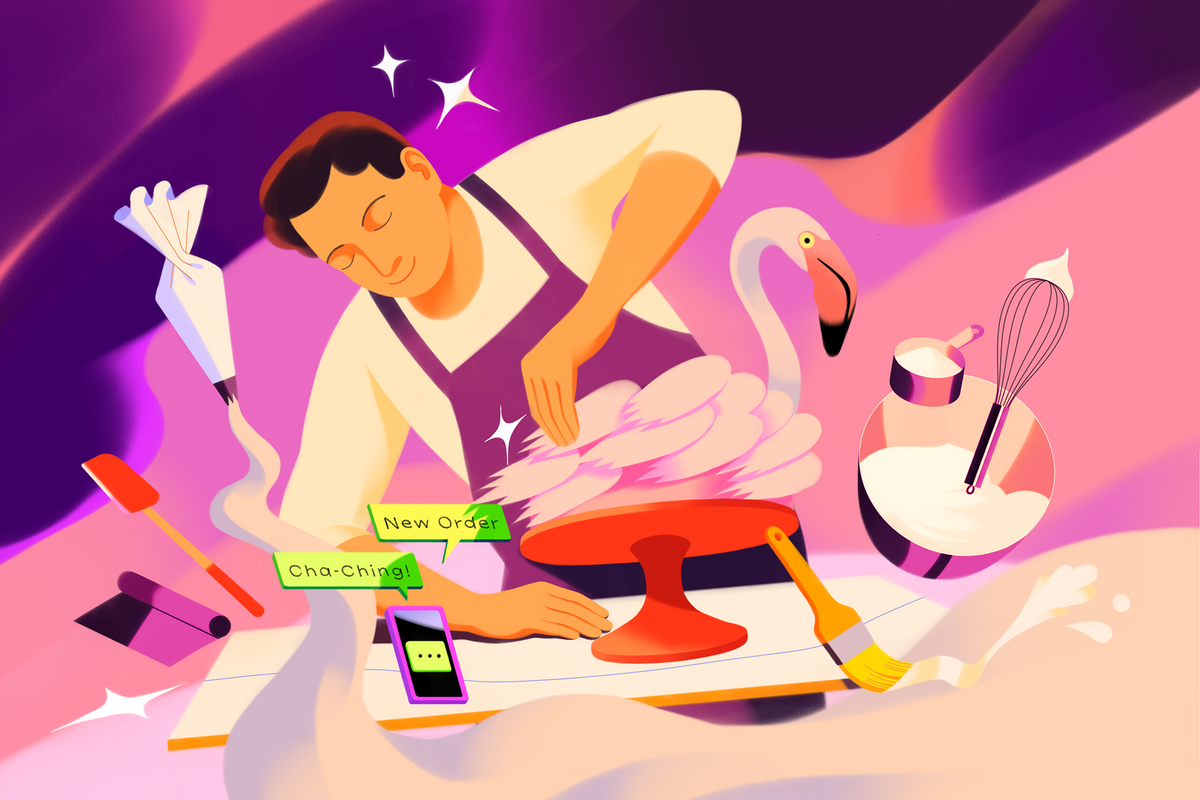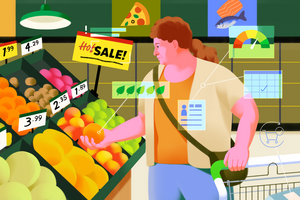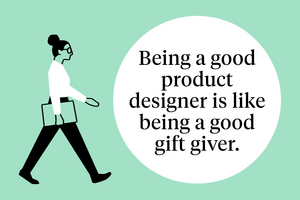Marketing Nov 1, 2024
It Literally Pays to Love Your Work
When products or services are also a labor of love, customers perceive them as more valuable—and are willing to pay more.

Yifan Wu
At an art fair some time ago, Jake Teeny had a puzzling conversation with an artist displaying his paintings.
“He was telling me how much he enjoyed making a specific painting,” Teeny says, “but he caught himself and added, ‘But I put a lot of work into it, and it took a long time to make it.’ Like he had to justify the fact that he enjoyed making it or I might discredit it.”
Unbeknownst to that artist, it was exactly the kind of phenomenon that Teeny, a Kellogg assistant professor of marketing, explores in his research.
Specifically, Teeny is curious about how our perception of how much someone enjoys making a product or providing a service—or their “production enjoyment”—might affect how we view the quality of that product or service. “When you hear someone say they enjoyed something, like that artist, you may think of them doing it casually or not taking it that seriously,” Teeny says.
One concern, then, is that this perception may lead us to believe that the quality of the product is lower—and potentially, make us want to pay less for it. But is this concern warranted?
To understand the link between how much someone enjoys making a product and people’s perception of its value, Teeny and collaborators Anna Paley and Robert Smith of Tilburg University and Daniel Zane of Lehigh University conducted several studies on the interactions between buyers and sellers for a variety of products and services.
As a whole, the studies showed that buyers actually associated production enjoyment with greater product quality and value, consequently increasing how much they were willing to pay for it. And yet sellers often charged less for the products and services that they enjoy providing, even though they also believed them to be of higher quality.
Exploring production enjoyment
In an early study, the researchers examined Facebook ads for peer-to-peer sellers and small businesses for evidence of how production enjoyment was perceived by buyers.
“Facebook sellers have the opportunity to communicate their enjoyment in different ways,” Teeny says. “It could be in the ad itself or in their personal biography on the landing page, which may feature quotes from a chef who made the meal or the person who made the jewelry.”
The researchers showed over 30,000 Facebook users one of two ads for an SEO specialist. One of them conveyed production enjoyment (“I really enjoy SEO”), while the other ad did not. The team found that the ad that conveyed production enjoyment had a 40 percent higher click-through rate and a 17 percent lower cost-per-click than the otherwise identical ad that did not mention production enjoyment.
“Intrinsic value often comes from enjoyment.”
—
Jacob Teeny
In another study, the researchers handed out brownies at a university campus fair. Over 300 people stopped by to choose from one of two handmade brownies in exchange for participation in a brief survey. Though the brownies were identical, each had a different note next to it from the pastry chef. One indicated high production enjoyment (“I really enjoy making it”), and the other, high popularity (“It’s a very popular item”). The results showed people were more likely to choose the brownie that signaled high production enjoyment and rate it as higher quality compared with the other (identical) one.
Collectively, these and several additional studies revealed that buyers associated production enjoyment with greater quality and value in the products and services, and were therefore willing to pay more for them. Buyers associate production enjoyment with intrinsic motivation—or the way people derive value from a process itself rather than its outcome or external rewards.
“Intrinsic value often comes from enjoyment,” Teeny says. “And there’s lots of research showing people produce better work when they’re intrinsically motivated, like studies on ‘flow’ or when people are in ‘the zone’ and just feel a piece of music or something else creative just pouring out of them.”
Production enjoyment, then, reflects intrinsic value on the seller’s part, which buyers may associate with a better end product.
A surprising divergence
In yet another study, the researchers posted a real data-entry job opportunity for people who were able to perform multiple different tasks that require a similar level of skill. Participants stated which one of the tasks they enjoyed more, along with their minimum hourly rate for each. The researchers found that the participants were willing to charge 14.5 percent less than the average price for the task they enjoyed more.
In other words, whereas buyers were willing to pay more for high production enjoyment, sellers were willing to charge less.
Sellers also see the intrinsic value of enjoying their work, and thus believe those products to be of higher quality, but ultimately still charge less. Why? “When sellers determine the price, they consider factors like material and advertising cost and the market they’re trying to reach,” Teeny says, “but also less tangible things like the work that’s going to go into the product and how much they enjoy it. If a plumber is going to take on a nasty task, they’re going to want higher compensation for it.”
Moreover, when someone enjoys the work, they may view the emotional satisfaction as part of their compensation and therefore charge a lower price. “Sellers may be anchoring more on the cost of emotional labor than the anticipated product quality,” Teeny says.
Importantly, specific factors can heighten or diminish this divergence between sellers and buyers. One of these factors is perceived skill. That is, when buyers infer that a production activity requires low skill—such as in one of the researchers’ studies comparing a simple-to-make mixed drink versus a more-complicated one—production enjoyment on the creator’s (bartender’s) part wasn’t as likely to increase a buyer’s perception of quality or willingness to pay.
“If the task is something AI-oriented or automated, for example,” Teeny says, “signaling enjoyment isn’t going to be as valuable as it is for higher-skilled, high-intensity kinds of activities, like something requiring a lot of handmade details.”
Buyers and sellers, take note
The results have practical implications for both buyers and sellers.
“Buyers should try to be more aware of sometimes-unconscious influences on the purchase process,” Teeny says. “There are classic things like paying more when you perceive scarcity, but we show perception of production enjoyment also enhances willingness to pay, so this is something to look out for.”
Sellers, meanwhile, should understand that buyers like to see evidence of production enjoyment. “Very rarely do sellers on Etsy or Fiverr or other sites mention the word ‘enjoy’ in their listings or biographies,” Teeny says. “If you enjoy an activity, don’t be afraid to share it.”
Teeny recognizes that sellers, like the art-fair vendor, may worry that signaling enjoyment could diminish the emotional labor that has gone into the work, but by and large, buyers are more concerned about the quality of the work.
“One way to signal you have a great product is to show that you enjoy the work,” he says. “If you’re a chef in an open kitchen, enjoyment is going to be a particularly strong signal buyers can see.”
Sachin Waikar is a freelance writer based in Evanston, Illinois.
Paley, Anna, Robert W. Smith, Jacob D. Teeny, and Daniel M. Zane. 2024. “Production Enjoyment Asymmetrically Impacts Buyers’ Willingness to Pay and Sellers’ Willingness to Charge.” Journal of Marketing.



